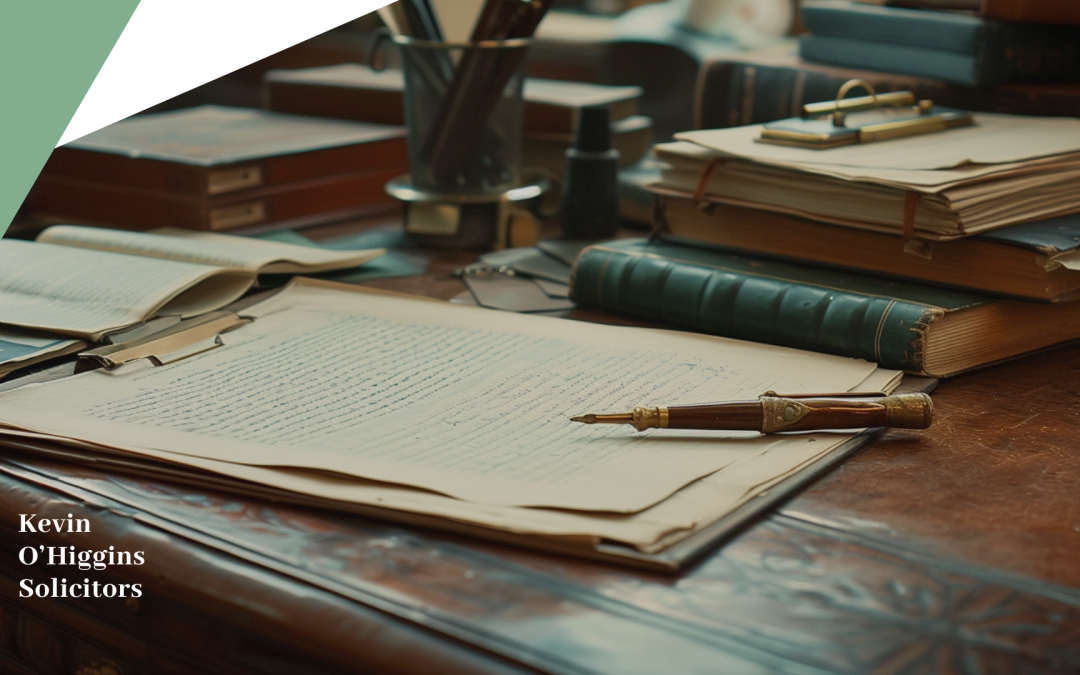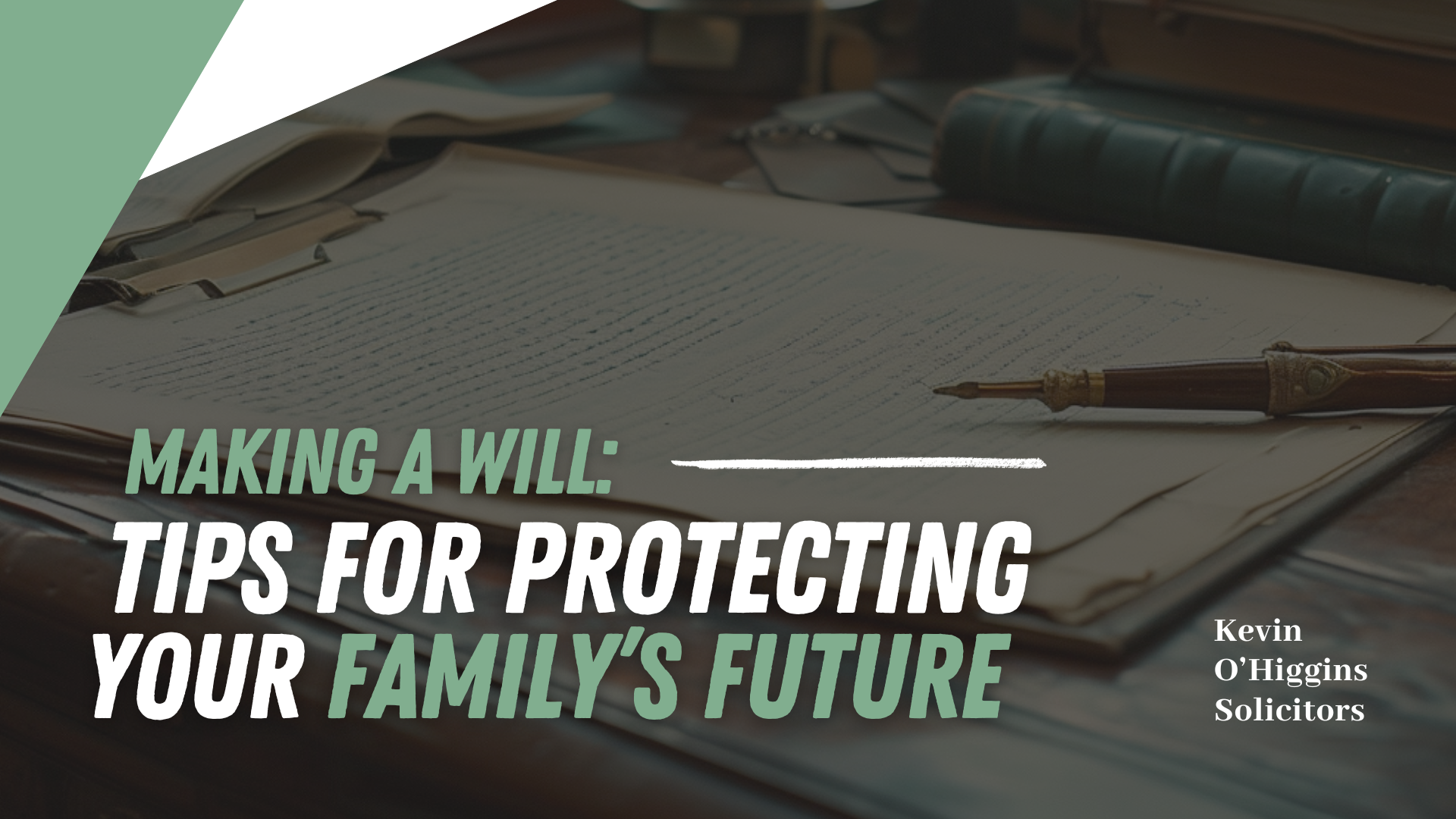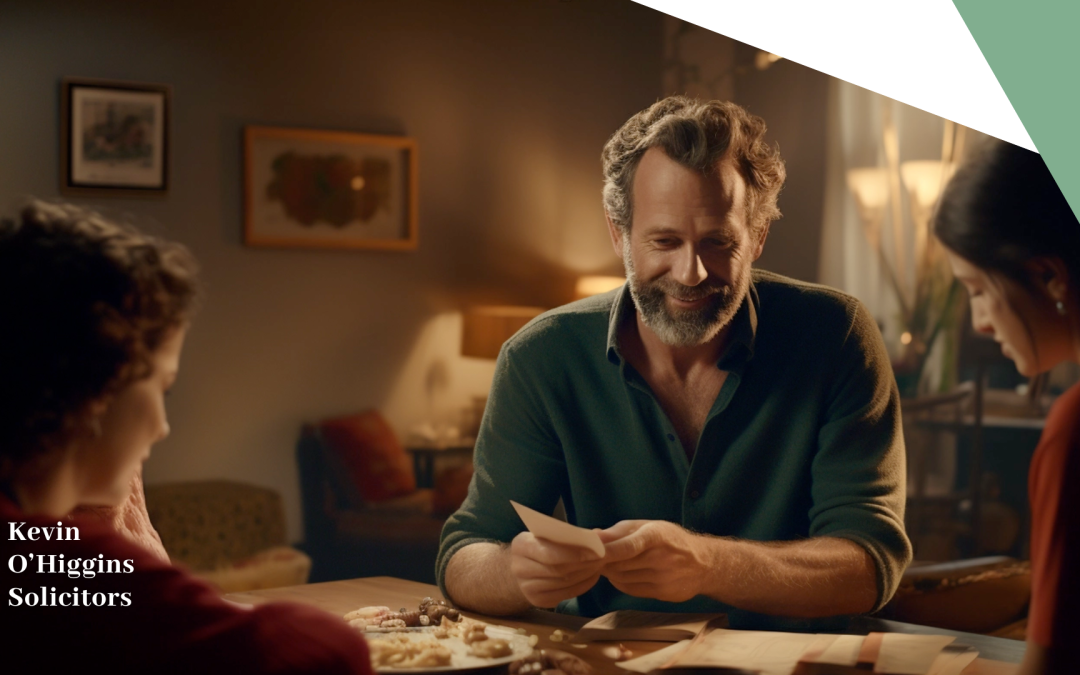
Making a Will in Ireland: Tips for Protecting Your Family’s Future
Introduction
For many individuals, the thought of making a Will evokes a sense of unease. It’s often intertwined with acknowledging our death. However, while seemingly daunting, this process is a fundamental act of care and foresight for our families.
Making a Will in Ireland is not just about laying out who gets what. It’s a deeply personal conversation with the future. It ensures that your loved ones are protected and provided for according to your wishes. The importance of making a Will cannot be overstated. It’s a necessity when considering the peace of mind it brings to you and those close to you.
In Ireland, the process of making a Will is surrounded by legal formalities. At its heart, it’s about family. It’s about making choices today that will support your family’s needs and respect your wishes tomorrow. Whether it’s ensuring that your children are looked after or that your spouse is financially secure, a Will is the tool that makes your intentions clear and legally binding.
This article will outline the process of making a Will. It breaks down the process into manageable steps and offers practical tips for those looking to safeguard their family’s future.

Understanding the Basics of Wills in Ireland
Making a Will is a crucial step in managing your estate. It also ensures that your assets are distributed according to your wishes after your death. In Ireland, the process and importance of creating a Will are governed by a clear legal framework. That said, the concept remains straightforward.
A Will is a legal document where you, the testator, declare how your assets should be handled. You decide who should be the beneficiary of these assets after you die.
Key Elements of a Will:
- Testator: The person making the Will.
- Executor: An individual or institution appointed to carry out the directions of the Will.
- Beneficiaries: The people or organisations who will receive your assets.
- Assets: Everything you own that you may want to distribute. This includes property, money, and personal possessions.
Legal Requirements:
For a Will to be valid in Ireland, certain conditions must be met:
- The testator must be at least 18 years old or married.
- The Will must be written voluntarily, without any coercion.
- The testator must be of sound mind. They must fully understanding the nature of the document and its implications.
- The Will must be signed by the testator in the presence of two witnesses. These witnesses must sign the document in the testator’s presence.
Why a Will is Necessary:
Without a Will, your estate will be distributed according to the rules of intestacy under the Succession Act of 1965. This may not align with your personal wishes or the needs of your family. As a result, it can lead to unintended consequences and disputes among your loved ones. A Will provides clarity, ensuring that your assets are distributed exactly as you intend. This offers peace of mind to both you and your family.
Creating a Will is not just about asset distribution. It’s also a form of protection for your loved ones. The document ensures they are cared for in your absence. This includes appointing guardians for minor children, making specific financial provisions, and even detailing your wishes for personal items that hold sentimental value.
In essence, a Will is your voice beyond your lifetime. It’s a testament to your care and consideration for your family’s future.
Understanding these basics is the first step towards making an informed decision about your Will. It lays the foundation for a secure future for your loved ones. By drafting a Will, you make sure all wishes are respected and carried out as you intended.
In the next sections, we’ll dive deeper into the implications of not having a Will. We also address the benefits of making a Will, and how to approach this important task with your family.

“What Happens If I Don’t Have a Will?”
The consequences of not having a Will in Ireland can be far-reaching. The result can often detract from what you might have wished for your family and assets. Dying without a Will, known as dying intestate, triggers a default legal process. This process may not reflect your personal desires or the specific needs of your loved ones.
Distribution Under the Rules of Intestacy:
When someone dies without a Will, their estate is distributed according to the rules of intestacy as outlined in the Succession Act of 1965. This might lead to outcomes that diverge significantly from what the deceased might have wanted:
- If married or in a civil partnership, the entire estate may go to the spouse or civil partner. This potentially overlooks the needs or wishes of other relatives or children from previous relationships.
- Children might inherit equally. However, this might not align with the deceased’s wishes for specific allocations or considerations for their individual needs.
- In the absence of a spouse, civil partner, or children, the estate could pass to parents, siblings, or more distant relatives. In this case, the result might not reflect the deceased’s personal relationships or intentions.
Emotional and Financial Strain:
The absence of a Will can place an additional emotional and financial burden on families during an already difficult time. Without clear directives:
- Family members may face uncertainty and disputes over the distribution of assets. This can lead to potential conflicts and strained relationships.
- The probate process can become more complicated and time-consuming. It can delay the distribution of assets and possibly incurring additional legal costs.
Guardianship of Minor Children:
Perhaps one of the most significant impacts of not having a Will involves the care and guardianship of minor children. Without a Will specifying guardianship wishes:
- The court will decide on the guardians for minor children. Their decision may not align with the deceased’s preferences or the children’s best interests.
- This uncertainty can lead to disputes among family members and potentially distressing situations for the children involved.
The absence of a Will can indirectly complicate the lives of those you care about most. Making a Will is not only about distributing your assets but also about providing for your family’s needs. By preparing in advance, you’re protecting their future.
Creating a Will can eliminate unnecessary legal hurdles and emotional distress. By understanding the potential impacts of not having a Will, it becomes evident why taking the step to create one is a critical act of care for your loved ones.
In the following sections, we’ll guide you through the benefits of making a Will and how to ensure it reflects your wishes for your family’s future.

Benefits of Making a Will for Your Family
Creating a Will is an act of foresight and compassion towards your family. It ensures that your assets are distributed according to your wishes and offers significant benefits that can impact your family’s well-being.
Here, we dive into the key advantages of having a Will in place. We also highlight how it serves to protect and provide for your loved ones in Ireland.
Clear Direction for Asset Distribution:
- Personalised Decisions: You have the control to decide exactly how your assets are divided among family members, friends, or charities, reflecting your relationships and values.
- Protection for Minor Children: A Will allows you to make specific provisions for the care and financial support of your children, including the appointment of guardians.
- Avoidance of Disputes: With your wishes clearly laid out in a Will, the potential for family disputes over the distribution of your estate is significantly reduced, helping to maintain harmony among your loved ones.
Minimise Legal and Financial Burdens:
- Simplified Probate Process: A clear and valid Will can streamline the probate process, making it quicker and less costly for your family to access their inheritance.
- Tax Considerations: Strategic estate planning through your Will can help minimise the tax burden on your estate, maximising the inheritance for your beneficiaries.
Peace of Mind for You and Your Family:
- Security: Knowing that your family will be taken care of according to your wishes provides peace of mind to both you and your loved ones.
- Clarity and Confidence: Your family will have the comfort of knowing they are fulfilling your final wishes, which can be a source of great comfort during a difficult time.
Adapt to the Changes of Life:
- Revisable Documents: Wills can be updated to reflect life changes such as marriage, divorce, the birth of children, or changes in financial circumstances, ensuring your estate plan remains aligned with your current situation and wishes.
Making a Will is a powerful way to communicate your love and care for your family. It’s about making thoughtful choices that reflect your desires and priorities. This ensures that your legacy is preserved and passed on in the manner you envision.
More than a legal document, a Will is a reflection of your commitment to your family’s future and well-being. By recognising these benefits, it becomes clear why making a Will should be a priority for anyone concerned with the welfare of their loved ones.
In the next sections, we’ll explore the key considerations when making your Will and how to start this important conversation with your family.

Key Considerations When Making Your Will
Crafting a Will is a thoughtful process that requires consideration of several key factors to ensure it accurately reflects your wishes and provides for your family’s needs.
Here are some crucial aspects to keep in mind when making your Will in Ireland. These elements are focused on making the process as comprehensive and beneficial for your loved ones as possible.
Assessing Your Assets and Liabilities:
- Inventory of Assets: Begin by making a detailed list of your assets, including property, bank accounts, investments, and personal possessions of value. Understanding what you own is the first step in deciding how to distribute it.
- Consideration of Liabilities: Be aware of any debts or obligations that may impact your estate. These liabilities can affect the net value of your estate and should be considered in your planning.
Choosing Executors and Guardians:
- Selecting an Executor: Choose someone you trust to carry out the instructions in your Will. This should be a person who is responsible, organised, and willing to take on this important role.
- Appointing Guardians for Minor Children: If you have children under the age of 18, deciding on a guardian is one of the most critical decisions. Consider who would best maintain your parenting style and values, and ensure you discuss this with the potential guardians before making your decision.
Making Specific Financial Provisions:
- Direct Bequests: You may wish to leave specific items or amounts of money to certain individuals or organisations. Be clear and specific to avoid any confusion or disputes.
- Trusts for Children or Dependents: For younger children or dependents with special needs, setting up a trust can ensure they are provided for in a way that meets their ongoing needs and circumstances.
Personal Sentiments and Legacies:
- Sentimental Items: Beyond financial assets, consider any personal possessions with sentimental value. Leaving these items to specific loved ones can have profound emotional significance.
- Charitable Donations: If there are causes or organisations you are passionate about, you can include provisions to support them in your Will, creating a lasting legacy.
Review and Update Regularly:
- Life Changes: Major life events such as marriage, divorce, the birth of a child, or the death of a beneficiary or executor necessitate a review and possible update of your Will to ensure it remains reflective of your current wishes.
- Legal Updates: Stay informed about any changes in legislation that might affect your Will or estate planning in general. It may be beneficial to consult with a legal professional periodically to ensure your Will complies with current laws.
Creating a Will is not a one-time task but an ongoing commitment to safeguarding your family’s future. It requires careful thought, clear communication, and regular updates to ensure it continues to reflect your wishes and life circumstances accurately.
By considering these key aspects, you can create a comprehensive Will that provides peace of mind for you and security for your loved ones.

How to Start the Conversation with Your Family
Discussing the creation of a Will with your family is a crucial step that can be sensitive and emotional. However, it’s also an opportunity to ensure transparency, understand expectations, and convey your wishes clearly.
This conversation can bring peace of mind to both you and your loved ones, knowing that plans are in place for the future. Here are some tips for approaching this important discussion:
Choose the Right Time and Setting:
- Timing: Select a time when your family is not preoccupied or stressed, ensuring everyone is more receptive and open to discussion.
- Setting: Opt for a comfortable and private space where you can speak without interruptions, allowing for an open and honest conversation.
Be Clear About Your Intentions:
- Purpose: Start by expressing your desire to ensure that everyone is taken care of and that your wishes are known and respected.
- Reassurance: Emphasise that this is about planning for the future and providing security for your loved ones, not about dwelling on the negative.
Involve Your Family in the Process:
- Expectations: Ask your family members about their expectations or concerns regarding the Will and estate planning. This can help address any potential issues early on.
- Decisions: While the final decisions rest with you, involving your loved ones in the conversation can help them understand your choices and reduce potential conflicts later.
Use Simple, Understandable Language:
- Avoid Jargon: Keep the conversation straightforward, avoiding legal terminology that might confuse or overwhelm your family members.
- Clarifications: Be ready to explain the reasons behind specific decisions, especially those involving guardianship, asset distribution, or special provisions.
Address Any Questions or Concerns:
- Openness: Encourage your family to ask questions and express their thoughts and concerns. This openness can lead to a more comprehensive understanding for everyone involved.
- Professional Advice: If there are complex issues or questions you can’t answer, suggest consulting with a legal professional together for clarity.
Follow-Up:
- Documentation: Consider summarising the key points discussed and any decisions made during the conversation in writing, and share this with your family.
- Updates: Let your family know that you’ll keep them informed of any changes or updates to your Will, maintaining an ongoing dialogue.
Starting the conversation about making a Will can strengthen your family bond, ensuring that everyone feels considered and respected.
It’s a step toward mutual understanding and peace of mind, knowing that your family’s future is thoughtfully planned for.

Navigating the Probate Process
Understanding the probate process is crucial for anyone making a Will in Ireland. It directly affects how and when your assets will be distributed to your beneficiaries.
Probate is the legal procedure that ensures your Will is valid and that your estate is distributed according to your wishes.
This section provides an overview of the probate process, its importance, and how having a Will simplifies this process for your loved ones.
What is Probate?
- Definition: Probate is the court-supervised process of authenticating a deceased person’s Will, assessing the estate, paying off debts, and distributing the remaining assets to the designated beneficiaries.
- Purpose: It serves to legally transfer ownership of the deceased’s assets to the beneficiaries and ensures that any debts or taxes owed by the estate are paid.
Probate with a Will:
- Executor’s Role: If you have a Will, you will be named an executor. This person is responsible for initiating the probate process, gathering and valuing your assets, paying off debts, and distributing the assets as you have directed.
- Simplification: Having a Will can significantly streamline the probate process. With clear instructions and appointed executors, the court can more easily validate your Will and allow the executor to carry out your wishes.
Probate without a Will (Intestacy):
- Administrator Appointment: If you die without a Will, the court appoints an administrator, usually a close family member, to manage your estate.
This process can be more complex and time-consuming, as the administrator must distribute the assets according to the default intestacy rules, which may not reflect your personal wishes.
- Complications: The lack of a Will may lead to delays, increased costs, and potentially disputes among family members over the distribution of your estate.
How to Simplify the Probate Process for Your Family:
- Detailed Will: Ensure your Will is clear, detailed, and legally valid to avoid any uncertainties or legal challenges that could complicate the probate process.
- Organised Documents: Keep your estate documents, including your Will, in a safe but accessible place, and let your executor know where to find them.
- Consider a Probate Solicitor: For more complex estates, consider advising your executor to hire a solicitor specialised in probate law to guide them through the process efficiently.
Benefits of Planning Ahead:
- Minimise Stress: By having a Will and understanding the probate process, you can minimise the stress and burden on your loved ones during a difficult time.
- Quicker Distribution: A clear Will can lead to a quicker probate process, allowing your beneficiaries to access their inheritance sooner and with fewer legal hurdles.
Navigating the probate process can seem daunting. With proper planning and a well-crafted Will, you can make it as smooth as possible for your loved ones.
This foresight ensures that your wishes are respected. It also provides peace of mind to both you and your family, knowing that everything is for the future.

Seeking Professional Guidance
Creating a Will is one of the most significant steps you can take to ensure your estate is managed and distributed correctly after you pass away.
While it’s possible to draft a Will on your own, seeking professional advice from an experienced solicitor can offer numerous benefits. This are helpful when navigating the complexities of estate planning in Ireland.
This section outlines why professional guidance is crucial and how it can streamline the process of making your Will.
Complexity of Estate Planning:
- Legal Expertise: Estate law can be complex and varies significantly by jurisdiction. A solicitor specialising in estate planning and Will drafting in Ireland can provide invaluable advice tailored to your specific situation, ensuring your Will complies with local laws and regulations.
- Customised Solutions: Every individual’s circumstances are unique, involving different family dynamics, assets, and wishes. Professionals can offer personalised strategies that best meet your estate planning goals, addressing issues like guardianship for minors, setting up trusts, and tax implications.
Avoiding Common Pitfalls:
- Validity Concerns: A professionally drafted Will minimises the risk of it being contested or deemed invalid due to errors or omissions. Solicitors ensure all legal requirements are met, including the proper signing and witnessing of the document.
- Clarification of Wishes: Legal professionals can help articulate your wishes clearly, reducing the likelihood of disputes among beneficiaries by providing clarity and precision in the language used in your Will.
Updating Your Will:
- Life Changes: Changes in your personal circumstances, such as marriage, divorce, the birth of children, or acquiring significant assets, may necessitate updates to your Will. A solicitor can help you make these adjustments to reflect your current wishes accurately.
- Legislative Changes: Laws related to estate planning and taxation can evolve. A legal professional stays updated on these changes and can advise you on necessary modifications to your Will to ensure it remains effective and compliant.
The Role of a Solicitor:
- Comprehensive Review: Beyond drafting your Will, a solicitor can review your overall estate plan, including assets, liabilities, and insurance policies, to ensure a holistic approach to your estate planning.
- Probate Process Guidance: They can also offer guidance on the probate process, helping your executor understand their duties and the steps involved in administering your estate.
Peace of Mind:
Ultimately, the most significant benefit of seeking professional help is the peace of mind it brings. Knowing that your Will has been prepared with expert care ensures that your wishes will be honoured, and your loved ones will be cared for as you intended.
Seeking out professional advice for drafting your Will is not just about the document itself. The right guidance can ensure your final wishes are accurately recorded and legally binding.
This professional input safeguards your estate and provides clarity and comfort to your family during what will undoubtedly be a challenging time. Listen to what Kevin O’Higgins had to say about drafting a Will alongside an experienced solicitor.

FAQs About Making a Will in Ireland
When considering making a Will in Ireland, many individuals have questions about the process, its implications, and how to ensure their wishes are accurately reflected.
This section addresses some of the most common questions, providing clear and concise answers to help demystify the process of creating a Will.
1. Do I really need a solicitor to make a Will?
While it’s possible to draft a Will on your own, consulting with a solicitor ensures that your Will complies with all legal requirements and accurately reflects your wishes.
Solicitors can also provide advice on complex issues. Such areas include tax planning, guardianship, and the establishment of trusts. These help reduce the likelihood of disputes among your beneficiaries.
2. What happens if I die without a Will in Ireland?
If you die without a Will (intestate), your estate will be distributed according to the rules set out in the Succession Act of 1965.
This may not align with your personal wishes and could lead to unintended consequences for your loved ones, including potential disputes and additional legal complications.
3. Can I change my Will after it’s been made?
Yes, you can (and should) update your Will to reflect changes in your circumstances. Common updates include marriage, divorce, the birth of children, or significant changes in your financial situation.
These updates are typically done through a codicil (an amendment to your Will) or by drafting a new Will entirely.
4. How do I choose an executor for my Will?
Choose someone you trust to be responsible and impartial, such as a close family member, friend, or a professional like a solicitor.
The role of an executor involves managing your estate according to your Will. Therefore, it’s important to discuss this responsibility with them before making your decision.
5. Are digital assets included in Wills?
Yes, digital assets, such as online accounts, social media, and digital currencies, can and should be included in your Will. It’s important to provide clear instructions on how these assets should be handled, including access details, to ensure they are managed according to your wishes.
6. How can I ensure my Will is followed?
Having a legally valid Will that is clear and unambiguous is the best way to ensure your wishes are followed. Additionally, discussing your Will and its contents with your executor and beneficiaries can help clarify your intentions and reduce the likelihood of disputes.
7. What is the difference between a Will and a living will?
A Will dictates the distribution of your assets after your death, while a living will (also known as an advanced healthcare directive) outlines your wishes regarding medical treatment if you become unable to communicate those decisions yourself.
Both are important components of a comprehensive estate plan.
For more frequently asked questions, read our new FAQ Guide on Making a Will in Ireland. Planning your estate is a significant task, but with the right information and guidance, it can be a smooth and reassuring process.

Conclusion: Planning for Your Family's Future
Making a Will is a big step in looking after your family’s future. It’s more than just filling out forms—it’s about making sure your wishes are followed and your loved ones are taken care of when you’re not around.
A Will helps you say exactly who should get what, from your house and savings to special items that mean a lot to you and your family. This way, you can avoid any confusion or arguments and make things easier for everyone.
We know talking about Wills and dealing with legal stuff can seem complicated. That’s why we’re here to help.
At Kevin O’Higgins Solicitors, we’re all about making the process straightforward and stress-free. We’ll listen to what you want, answer your questions, and make sure your Will does exactly what you need it to do. Whether you’re writing a Will for the first time or updating an old one, we’re here to guide you every step of the way.
Creating a Will is important for everyone, no matter what you own. It gives you peace of mind, knowing your family will be okay and that your wishes will be respected. If you’re thinking about making a Will or just want to talk about your options, get in touch with us.
Contact Kevin today to start planning for your family’s future. It’s one of the most caring things you can do for them.

















